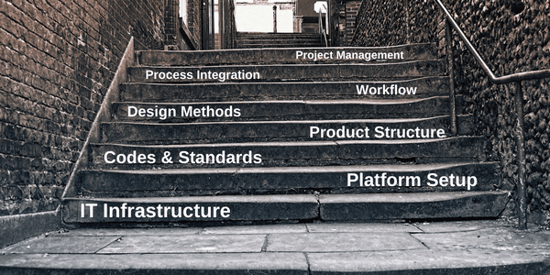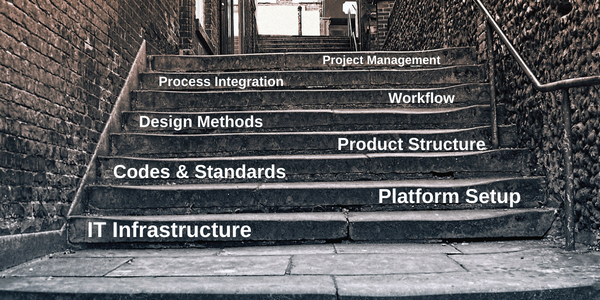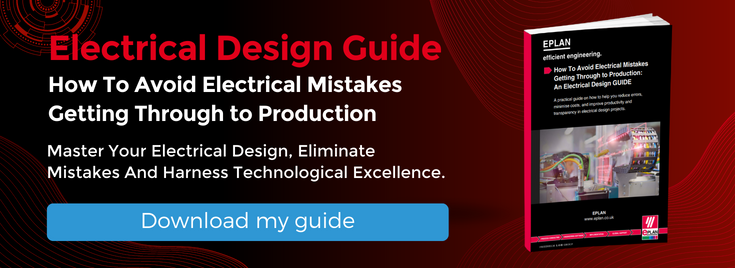Author
 Barry Chatham
Barry is a Business Consultant for EPLAN UK, working closely with the commercial team and a facilitator to the technical team in ensuring that EPLAN are delivering the right value at the right time to our customers.
Having graduated as an Industrial Designer and being deeply immersed in a wide range of disciplines, the learning curve in each of Barry's roles has been vast. This brings with it a wealth of experience, something demonstrable from recent years in CAD software such as Siemens PLM and more recently SolidWorks, where starting in technical and moving into commercial roles, Barry has successfully assisted hundreds of companies through transitional change and added value not only to his customers but heavily focusing on their customers and delivering results in dozens of different industries.
Having been asked the question years ago at an interview, it changed his outlook and discussions on the manufacturing industry, the question was "I make scissors in Sheffield as a consultant, I want you to make me more money"...
This question, and the "so what" methodology enabled Barry to see from a different perspective, something which is proving to be very well received with some of our customers already.
Chatham.b@eplan.co.uk
Barry Chatham auf LinkedIn
Barry Chatham
Barry is a Business Consultant for EPLAN UK, working closely with the commercial team and a facilitator to the technical team in ensuring that EPLAN are delivering the right value at the right time to our customers.
Having graduated as an Industrial Designer and being deeply immersed in a wide range of disciplines, the learning curve in each of Barry's roles has been vast. This brings with it a wealth of experience, something demonstrable from recent years in CAD software such as Siemens PLM and more recently SolidWorks, where starting in technical and moving into commercial roles, Barry has successfully assisted hundreds of companies through transitional change and added value not only to his customers but heavily focusing on their customers and delivering results in dozens of different industries.
Having been asked the question years ago at an interview, it changed his outlook and discussions on the manufacturing industry, the question was "I make scissors in Sheffield as a consultant, I want you to make me more money"...
This question, and the "so what" methodology enabled Barry to see from a different perspective, something which is proving to be very well received with some of our customers already.
Chatham.b@eplan.co.uk
Barry Chatham auf LinkedIn
The Eight Steps to Engineer More Efficiently
Machine and panel builders are continuously under pressure to change - new rules from the government, increased competition, a market asking for lower costs and shorter throughput times, Industry 4.0 which connects everything and makes everything transparent - are merely examples of the challenges engineers face. An optimum and flexible design process is very important if you want to withstand these challenges. But how can that be achieved? Here are eight elements for efficient engineering.
 The eight fields of action.
The eight fields of action.
At EPLAN, we don't have the slogan 'efficient engineering' for no reason. In 32+ years we have learnt a lot about how to structure the engineering process efficiently. We have worked closely with engineers and have developed countless best practices. This knowledge and efficient engineering experience has been combined to make EPLAN Experience. I would like to share this knowledge and experience with you because there are several ways that you can profit from it in your engineering process.
Use Applications Better
Firstly, the engineering software could be organised better on an application level. The software can help engineers work more efficiently in many ways. However, in practice, engineers often only use a fraction of the software's capability. You can improve the use of the applications by organising the application better and using more functionalities - which are often already included in your software license.
What Degree of Efficiency is Beneficial for You?
Secondly, you need to either standardise, modularise or structure the engineering process. This step isn't only about adapting standards in the design process, but also about reusing partial designs for new products or systems. Every engineer does this to some extent. You can be more efficient in the design process by installing a library of reusable, configurable and multidisciplinary process modules. This allows you to customise in a less time consuming way by combining 'standard' modules.The Design Database
The third step involves the design database. There are three stages:- Optimising by combining basic engineering and detail engineering
- Design automation: generating electrical and fluid power schematics
- Automatic configuration: complex products are configured simply and efficiently from a library of pre-defined mechatronic components.
It should be noted that automatic configuration is not the end goal for every engineering discipline. What is a must for one organisation to have an efficient work process can be pure overkill for another. Choosing the right level of standardisation and automation is perhaps one of the most important steps to more efficient engineering.
Eight fields of action
EPLAN Experience outlines which steps lead to an efficient engineering process. Every organisation is different and needs to take a custom approach. It isn't a universal blueprint for how you should organise your engineering, but here are the eight fields of action for engineering efficiently.
1. IT Infrastructure
The first step to engineering efficiently is structuring your EPLAN software correctly in your companies IT infrastructure. By doing this, you create a high-performance IT infrastructure with a faultless, clear and reliable installation and update process.
2. Platform Setup
How can you structure your CAE applications in the most optimal way? Having the correct customer-specific structure makes your systems as efficient as possible.
3. Codes & Standards
Guidelines for the optimum settings and the use of devices and master data so that you meet all of the relevant worldwide standards for documentation and production, such as the IEC 81346, ISO 1219, IEC 61355 and NFPA/JIC.
4. Product Structure
A clear method for structuring your machines and systems. This forms a clear base to automate engineering and for interdisciplinary cooperation.
5. Design Methods
This is about selecting and implementing the most efficient design method for your work, which results in a considerably shorter engineering process.
6. Workflow
Evaluate and automate design tasks by scripting or using Application Programming Interface (API). This leads to a quicker engineering process, in which data technology is integrated and consistency is guaranteed.
7. Process Integration
Integrate the engineering data and workflows into your company processes. You can do this, for example, by combining the construction process with processes such as ERP and PDM.
8. Project Management
Do you want to maximise productivity in as short a time as possible? This starts with an extensive project plan, based on standardised implementation processes.
EPLAN Experience is more than a list of action points. It is an international programme of training, webcasts, efficiency days and expert dialogues. Every company can experience what efficient engineering can mean for them from our experience.
If you are interested, and would like to know more contact us today to see how you can make your engineering processes more efficient.
- Industry 4.0
- Efficient Engineering
- EPLAN Experience
- Standardise
- Structure
- Automatic Configuration
- IT Infrastructure
- Codes & Standards
- Product Structure
- Design Methods
- Workflow
- Process Integration
- Project Management
- Design Process
- Basic Engineering
- Detail Engineering
- Design Automation
- Platform Setup
- EPLAN
- TRENDS




Comments